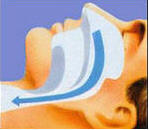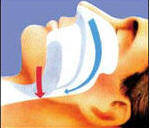 |
 |
|
Normal |
Obstructed |
OSA (Obstructive Sleep Apnea)
occurs when the upper airway
repeatedly collapses during
sleep, causing cessation of
breathing (apnea) or inadequate
breathing (hypopnea) and sleep
fragmentation. This condition
results in disruption of sleep
patterns and causes excessive
sleepiness or fatigue during the
day.
How is Sleep
Apnea diagnosed?
Your
doctor will examine you and ask you and possibly
your bed partner questions about your lifestyle,
snoring, sleep behavior, and how tired you feel
during the day. If your doctor thinks you may have
sleep apnea, he or she may suggest a sleep study.
Sleep studies find out how often you stop breathing
or have shallow breathing and how much oxygen you
have in your blood during sleep. An overnight sleep
study is the only way to determine if snoring is
benign or it is a sign of obstructive sleep apnea.
How is Sleep Apnea treated?
If you
have mild sleep apnea, you may be able to treat it
on your own by losing weight, developing good sleep
habits, and avoiding alcohol and certain medicines
before bed. If you have mild or moderate sleep apnea
you may be a candidate for a mouthpiece. Only a
sleep specialist can help you decide what is
appropriate for you.
If you
have moderate to severe sleep apnea, you may need to
use a breathing device called a
CPAP (continuous positive airway pressure) that
prevents your airway from closing during sleep.
What is the Link Between OSA and Hypertension
The
Joint National Committee on Prevention, Detection,
Evaluation and Treatment of High Blood Pressure (JNC
7). The JNC 7 guidelines for the Prevention,
Detection, Evaluation and Treatment of High Blood
Pressure, the committee listed Sleep Apnea as a
known cause of hypertension and recommended that
when working with a newly diagnosed hypertension
patient or a patient with resistant hypertension,
the physician should consider screening the patient
for Obstructive Sleep Apnea.
What is the Link Between OSA and Heart Failure
-
CHF
affects 1.5-2% of the population
-
There is a high prevalence of sleep-disordered
breathing in patients with CHF (~40-50%)
-
Heart Attack
-
Many
of the mechanisms in OSA may play a role in
patients with heart failure
-
Sexual dysfunction
What are the health consequences of untreated Sleep
Apnea?
Near Term
-
Automotive Accidents (sleep-related accidents
comprise 15-20% of all motor vehicle crashes)
-
Excessive Sleepiness
-
Neurocognitive and Performance Deficits
-
Decreased Quality of Life
Long Term
-
Hypertension
-
Heart Disease
-
Heart Attack
-
Arrhythmias
-
Stroke
|
Good Night
Sleep Center
accepts the following forms of payment: |
|
 |
 |
 |
 |
 |
 |





